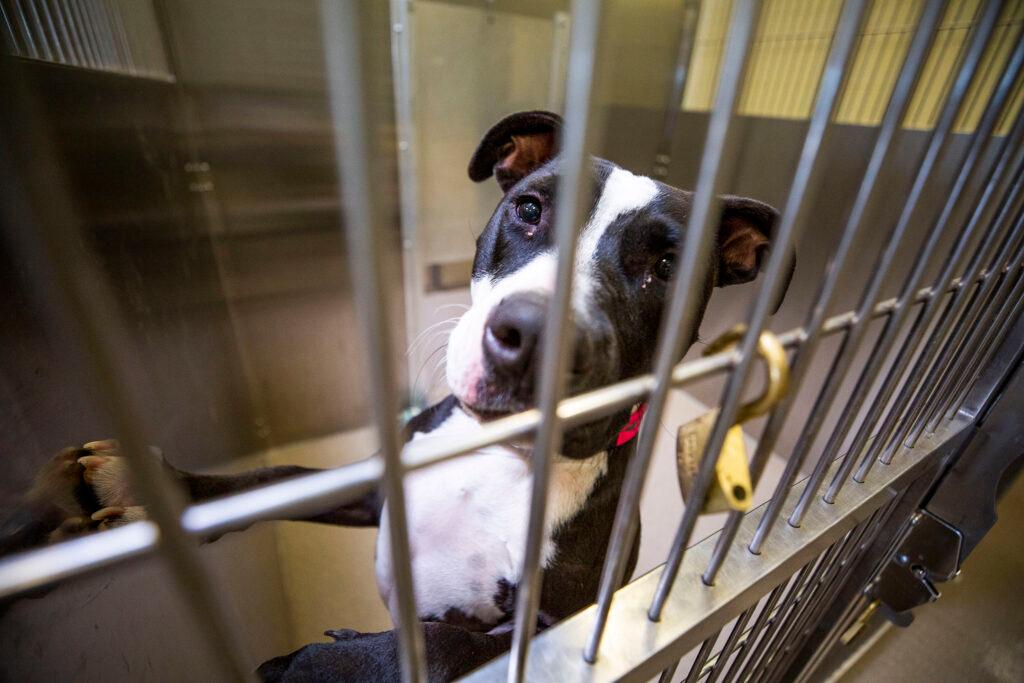
The season of respiratory illnesses is upon us. But coughs, colds, and fevers are not just affecting humans; they’re hitting our canine pals, too. And this year, contagious respiratory illnesses have been unusually prevalent in dogs.
Veterinarians in Colorado, as well as in several other states, have noticed more sick dogs coming into their offices with coughs than in past years. While it’s not uncommon for dogs to get respiratory illnesses — often called “kennel cough” — this time of year, some dogs are showing up in exam rooms with severe coughs or pneumonia.
Typically, infectious disease like a cough lasts for seven to 10 days and resolves “pretty quickly,” said Dr. Maggie Baldwin, Colorado state veterinarian. “What appears to be different [this year] is that these are presenting with prolonged coughs that are lasting weeks to months and they have minimal response to treatment. In some cases, the dogs have progressed to contracting pneumonia and requiring hospitalization.”
Depending on whether the dog is infected with a virus or a bacteria, treatment could include antibiotics or other types of supportive care. To define which course of action to take, veterinarians will use a PCR test, much like we use to test for COVID-19, which looks for a variety of known illnesses that affect dogs — including SARS-CoV-2.
What is tricky with PCR tests is that they are most effective when used within 72 hours of the first onset of symptoms, so they’re less accurate the longer a dog has been sick.
Veterinarians from all over Colorado have contacted the state’s Department of Agriculture with reports of respiratory illnesses in the dogs they’re seeing, said Baldwin. The state is working with both local and federal researchers to figure out whether it’s a single virus or multiple ones that are affecting dogs this year.
Dr. Amanda Cavanagh, with Colorado State University, said her office doesn’t yet know what’s causing the increase in respiratory illnesses, but they’re partnering with the state to investigate.
“The term ‘mystery illness’ [has been] tossed out there, but I don't know that that's what we're dealing with,” Cavanagh said.
Baldwin agreed.
“There has not been any conclusive testing to indicate what might be causing this increased prevalence in disease,” she said. “That doesn't necessarily mean that what we're seeing is a new or novel virus. [There are] a lot of different causes for canine respiratory infections, but it just means that we might not be testing enough or we might not be testing at the right time in the course of disease to pick that up.”
In the cases where dogs developed pneumonia, that more severe illness is caused by a secondary bacterial infection and not indicative of the initial cause of the illness, Baldwin continued.
“Typically for viral respiratory infections,” said Baldwin, “You really have to test early in the course of disease in order to actually catch the virus itself on diagnostic testing. “
Dr. Silene St. Bernard, the regional medical director of VCA Animal Hospitals, said the one thing that people shouldn’t do is panic.
“When we can't pinpoint something, people get concerned. But there's nothing in terms of numbers of pets or severity at this point,” she said. “We're certainly addressing it, looking for reasons and doing the research. We need to try and identify if there's something going on that we need to be more aggressive in managing.”
In the meantime, here are some tips for keeping your dog healthy.
Watch out for these symptoms
Symptoms of respiratory illness in dogs include coughing, sneezing, nasal or eye discharge, and lethargy. Even if your dog has one symptom and not the others, call your veterinarian.
Get your dog vaccinated
One of the best ways to keep your dog healthy is to make sure they’re up-to-date on all of their vaccines. That includes the normal group of shots — such as distemper, adenovirus, and parainfluenza — your veterinarian administers every one or three years, and two vaccines that aren’t always part of routine vaccinations: intranasal bordetella and canine influenza.
“Those two vaccines… are sometimes optional vaccines and recommended if your dog is going into grooming or is going into boarding,” said Cavanagh. “But at this point, I recommend that every dog get those two vaccines.”
Once your dog is fully vaccinated, it’s important to wait at least two weeks before allowing them to interact with dogs they don’t live with. This gives them time to develop full immunity.
Keep your dog away from social spaces
Respiratory viruses spread through nose and mouth contact with contagious dogs. Dog parks, groomers, boarding facilities, pet stores, and other social spaces are prime spots for viruses to spread. If you have the option, keep your dog from interacting with dogs outside your home.
That includes brief greetings on the sidewalk.
“If I were out walking my dog and somebody said, ‘Oh, can my dog come up and say hi to your dog?’ At this point, I might say, ‘no thanks,’” Cavanagh said. “We will go about our walk without making that close contact with other dogs just because most of these viruses and bacteria are shed through the nose and through the mouth and are passed that way dog to dog.”
If you have to board your dog or put it in daycare, check to see whether the facility requires proof of vaccination against respiratory diseases like Bordetella and influenza.
Another thing you can check is whether that facility does “a good job with cleaning and disinfection,” said St. Bernard. It’s also important that they have “your contact information to reach out to you if there's an issue and that they know who your veterinarian is in case there's any kind of a problem.”
What to do if your dog is sick
If your dog has developed a cough, eye or nasal discharge, or is acting lethargic, call your vet as soon as possible. A cough doesn’t necessarily mean your dog has contracted a dangerous respiratory virus; it could be an indication of other underlying medical issues.
“[A] cough can be benign, but cough can also be really troublesome,” said Cavanagh “It could be caused by a bacterial pneumonia that does need antibiotics… It can be caused by things that are similar to asthma in people.”
Some cases of pneumonia progress quickly, making dogs very sick within 24 to 36 hours, so dog owners need to act quickly.
St. Bernard said your veterinarian will use a PCR test to determine what might be causing your dog’s symptoms; This is the same nasal or throat swab that humans have become familiar with for COVID-19 testing. That PCR test will look for a variety of known respiratory illnesses in dogs, and depending on what comes back, your vet will choose a treatment plan.
“We generally treat respiratory disease relatively similarly regardless of the cause: So the two different buckets are viruses and bacteria,” said St. Bernard. “If we come up with a bacteria, then if they're really sick, we'll often use some antibiotics. If it's a virus, we won't [use antibiotics] because antibiotics don't work on viruses, so they get treated with supportive care.”
But if it is a respiratory illness, it’s important to get your dog tested within 72 hours of it first displaying symptoms. That will help your vet diagnose exactly what’s going on.









